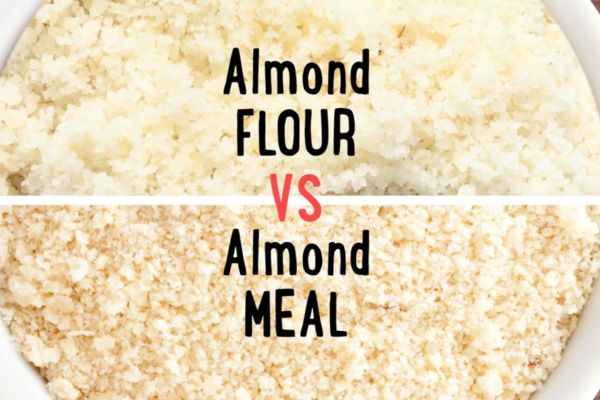Is Almond Flour Gluten Free? The FACTS You Must Know
Almond flour is gluten free. Almond flour is made by finely grinding almonds (with or without skin). Almonds are gluten free nuts making almond flour also gluten free.
Is Almond flour gluten free? This is a common concern for people with Celiacs or gluten intolerance.
Yes, almond flour is gluten free. Because it is prepared by grinding almonds with or without skin. Almonds are gluten free, so almond flour is also gluten free making it a popular substitute of wheat in gluten free baking.
Almonds are seeds found inside fruit of almond trees; a plant species native to Iran and surrounding areas of the Middle East.
People with Celiacs and wheat intolerance can’t enjoy baked goods. Because wheat flour is the core ingredient in baking. But wheat has gluten in it.
Almond flour is the best substitute for wheat flour. Almond flour adds flavours as well as nutritions to your diet.
In this article you’ll explore almond flour nutrition, gluten free almond flour brands and its benefits. We’ll also compare almond flour with its substitutes.
What’s the Difference between Almond Flour and Almond Meal?

Are you also confused between almond flour and almond meal? Many people use almond meal and almond flour interchangeably. But both are not the same things. Although both are prepared with ground almonds, they differ in terms of preparation, composition and texture.
Almond flour is prepared with blanched almonds without their skin on. So it is white in colour and has a fairly fine texture. As it contains almond only it is gluten free and safe for celiacs.
An almond meal is prepared by almonds with their skin on. So it is slightly brown in colour and has a coarse texture. It is also gluten free.
Is Almond Flour Gluten Free?
Yes, almond flour is gluten free. Almond flour is prepared by grinding almonds with or without their skin. So people with Celiacs or gluten intolerance can enjoy it without any worries.
Almond flour is a versatile ingredient in gluten free dining with its nutty and sweet taste. It is used in gluten free baking or coating for fried foods. It can also be used as a thickening agent in gluten free soup, stew and sauces.
Although Almond flour is gluten free, there is a little risk of cross contamination. If you’re highly sensitive to gluten, always look for certified gluten free almond flour brands.
What’s the Nutrition Value of Almond Flour?
Total nutrition we get from 14g almond flour as per Nutrition Value is here;
| Nutrient | Amount Per 14g | % Daily Value |
|---|---|---|
| Calories | 80 Kcal | |
| Total Fat | 7g | 9% |
| -Saturated Fat | 0.5g | 2% |
| Total Carbohydrates | 3g | 1% |
| -Dietry Fiber | 2g | 7% |
| -Sugar | 1g | – |
| Protein | 3g | 6% |
| Calcium | 38mg | 3% |
| Iron | 0.5mg | 3% |
| Potassium | 103mg | 2% |
What’s the Benefits of Almond Flour?
Almonds are very nutritious as it is a rich source of vitamins, minerals, and antioxidants which can provide effective health benefits.
Incredibly Nutritious
Almond flour is a rich source of vitamin E which is actually a group of fat soluble compounds acting as antioxidants.
Vitamin E prevents you from aging and risk of heart disease and cancer by preventing the damage from harmful free radicals.
Almonds are also a great source of magnesium which give you several benefits such as improving blood sugar and lower blood pressure.
Regulating Your Blood Sugar Levels
Foods prepared with flour are not really nutritious as they have high carbs but are low in fat and fiber. Whole foods with almond flour have high fiber and low in carbs.
Almond flour has a low glycemic index which means that it releases sugar in blood and doesn’t cause a spike in glucose level in blood. Thus it controls blood sugar level.so it’s perfect food for diabetic patients along with celiacs patients.
Heart Health
Heart diseases are caused by high blood pressure and bad LDL cholesterol. Heart disease has become the leading cause of death.
Studies show that almonds can be beneficial for both high blood pressure and bad cholesterol. So almonds can lower the risk of heart diseases.
Improve Digestive Health
Almonds have a lot of prebiotic dietary fibers. This fiber is digested by bacteria present in your small intestine which ultimately leads to a healthier digestive system.
Lowering risk of Cognitive Disease
Almonds also prevent you from developing cognitive diseases like Alzheimer’s disease. Almond flour is a rich source of vitamin E which is a known antioxidant helping your brain.
So substituting wheat flour with almond flour not only enhances taste but also provides you numerous health benefits.
What are Certified Gluten Free Brands?
Although baking with Celiacs requires careful thinking about ingredients, but it doesn’t need to be too bored or tasteless. You can enjoy delicious dine with gluten free almond flour. Here some certified gluten free almond flour brands:
- Honeyville
- Anthony’s Goods
- Anita’s Organic Mill
- Wildly Organic
Don’t forget to check the gluten free label on packaging of almond flour. If it doesn’t have a label you should look for its ingredients list.
How to Make Almond Flour at Home?

Can’t find gluten free almond flour or you’re highly sensitive to gluten? Don’t worry, you can also make it yourself. Making almond flour is quite easy. It is also tricky to get evenness from store bought almond flour.
To make almond flour, just blend some almonds in a high speed food processor. Stop the blender when you get a flour-like texture. Don’t blend too long as it will result in almond butter.
Gluten Free Recipes with Almond Flour
Almond flour is easy to bake with. As in most of the recipes wheat flour is simply replaced by Almond flour. Almond flour is a gluten free alternative to wheat. Its nutty and sweet taste enhances the deliciousness of the dishes. Here are some recipes to try with almond flour.
- Sweet and sour crackers
- Almond flour bread
- Gluten free strawberry cake
- Gluten free chocolate cake
- Almond flour zucchini bread
- Chicken parmesan with spaghetti squash
With almond flour you can not only enjoy gluten free baking but enhance the taste and nutrition of your recipes. Enjoy healthy eating!
Comparing Gluten Free Almond with Other Flours
Many people prefer almond flour over coconut flour and wheat flour as it is more nutritious than other alternatives.
Wheat Flour
wheat flour has a higher carbs content. But almond flour is lower in carbs and higher in fat. That means almond flour has higher calories than wheat flour. But almond flour is gluten free and is a rich source of vitamin E, magnesium and fiber. Almond flour also helps your gut to increase reabsorption of nutrients.
Coconut Flour
Coconut flour is higher in carbs and lower in fats. Although coconut and almond flour both are gluten free but it is difficult to bake with coconut flour. It makes baked goods dry and crumbly.
The Bottom Line
Almond flour is gluten free. It is also an excellent substitute for wheat and other gluten-containing flours.
If you are celiacs then you can actually enjoy baked goods with almond flour. It not only made baked good delicious but also enhance their nutrition and taste,
If you’re highly sensitive to gluten, you should always prefer certified gluten free brands of almond flour. Also check the label before consumption.
Enjoy gluten free and healthier baking with almond flour!
You Can Also Read: Is Peanut Butter Gluten Free?







